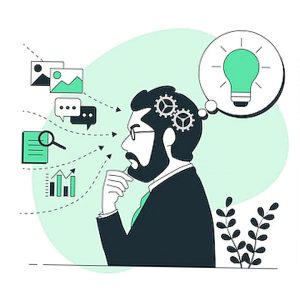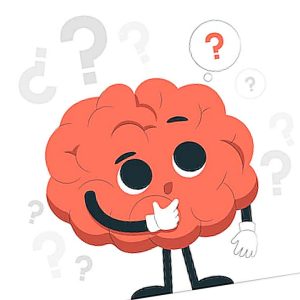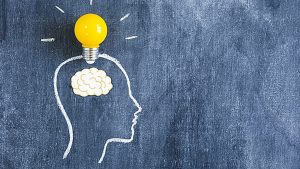How To Develop Critical Thinking Skills: Critical thinking has to do with the one’s thought process and its result. Critical thinking is the application of logical principles, rigorous standards of evidence, and careful reasoning to the analysis and discussion of claims, beliefs and issues. Critical thinking is a deep form of thinking.
It entails a holistic evaluation of all available resources and evidence in order to arrive at a sound and beneficial result or conclusion. One of the instructive attributes of critical thinking is that it is always subjective. Thus, it is not a selfish form of thinking. The purpose of critical thinking is to make a decision. The exercise is also made for the purpose of contributing positively to the society. In other words, what counts is the ability to evaluate situations and come up with a beneficial idea. It is through critical thinking that all problems are solved. Critical thinking is in fact a skill.
It does not always come handy. Yes, some people are better at critical thinking than others. But one may have to develop the skill to its best, even when it seems naturally inherent in the person. Below are how to develop critical thinking skill.
Recommended: How To Multitask Effectively: 10 Tips
11 Tips On How To Develop Your Critical Thinking Skills
1. Self-awareness: One who desires to develop his ability to think critically must first be conscious of himself and his environment. This enables the person to be cognizant of his shortcomings and credits. By being self-ware, one becomes intentional of his thought process, his values, ethics and other factors which are very likely to influence the thought process.

This enables the person to be able to highlight what is relevant and what is not, for the purpose of arriving at a beneficial result.
2. Learn active listening: Being a critical thinker entails being able to evaluate evidence and apply them to the given circumstance, in view of producing a beneficial result. One who desires to be a great critical thinker must learn how to listen actively. Listening actively entails that the listener is patient to listen to and consider all available information.

It is the process of attending carefully to what a speaker is saying. Listening takes patience, and a critical thinker needs certain information needed to evaluate evidence; such information which can be gotten and understood through active listening. One may have to be intentional about learning and practising active listening.
Recommended: 9 Essential Characteristics of a Good Constitution
3. Build foresight: A critical thinker can be likened to a clairvoyant person because he is one who is capable of visualizing and preparing wisely for the future. He is not a magician.

He is one who simply makes use of the available ideas and information, and applies them to in evaluating the available evidence in order to arrive at a conclusion. A critical thinker needs foresight ability. This can be developed by thinking both objectively and subjectively, and by considering the future and possible outcomes of the decisions made.
4. Extracting information by raising questions: Still on the need for information, to develop one’s critical thinking ability requires that the person should be able to extract information. Thus, questions must be asked. It is however, not necessarily extracting information.

Questions could be asked not only to extract information but to raise critical issues of which answers will be provided in due course. Raising such issues constructs one’s mind to what is most important (that is, the problem intended to be solved). The answers to the questions to the questions raised can come later, and this marks a remarkable progress in arriving at a solution.
5. Take up leadership roles: Taking up leadership roles is very important in developing one’s critical thinking ability. Leadership is an opportunity and a task to deal with people that have diverse thought processes. It places you on a position where you learn to see things objectively, because every leadership role is always for safeguarding the interest of the members. In taking leadership roles, one can also take a step further and take leadership trainings.

Leadership is all about thinking for the betterment of the majority. Leadership enables one to take critical decision and manage tasks. The experiences that are gotten from leadership roles are unquantifiable in developing critical thinking ability of individuals.
Recommended: How To Concentrate/Focus When Studying: 12 Tips
6. Take mentorship programs: Learning from mentors has been proved to be positively impactful. Life is all about decision-making.

When people look up to another, they tend to be curious about discovering what triggers their reasoning; and why they act approach situations the way they do and how they have achieved all they did through the decisions they made. Learning from mentors can be exemplary or by direct teaching.
7. Have a trusted source of information: One who is desirous of developing his critical thinking ability but appreciate the essence of information in critical thinking. Information sums up the entire process for critical thinking in the sense that from the time of gathering idea up till the time of evaluating evidence, information are being put in use.

Therefore, one must ensure that his source of information is legit. It is of course normal to receive information that is not trusted. It is the ability to sieve out the relevant and trusted ones from the other that counts; and this is the hallmark of critical thinking. One cannot be a good critical thinker with unreliable sources of information. As a good critical thinking, it is also important that you do your own research.
Also see: How To Graduate With First Class In The University: 11 Effective Tips
8. Team work opportunities: Opportunities for team work must not be neglected, for it is impactful in developing one’s critical thinking ability. This is because, when you work as a team, you get to have direct contact which other people’s reasoning and perspective.

It is more impactful because you do not just listen to their perspective; you are also compelled by your immediate responsibility to see their line of thought, hypothetically apply it to the given task and envision how workable they are. Whatever decision the team comes up with is going to be implemented. So, team members are compelled to reason from all angles and arrive at the best possible decision. This places one in a position where his critical thinking ability is developed.
9. Do not be quick to conclusion: A critical thinker must be patient with information. He must not act as soon as information arrives.

He must painstakingly evaluate them and even wait for more to arrive. He must be slow at arriving at a conclusion; otherwise, he would arrive at detrimental and wrong results.
Also see: Why Students Hate Maths: 14 Reasons
10. Be objective and open-minded: Developing your critical thinking ability demands that the thinker must be objective making any evaluation. He must be objective in the sense that he ought not to be influenced by emotions or prejudice.

His objective analysis is mostly needed. Any form of subjectivity must be only for the sake of juxtaposition. He must be open to diverse possibilities, ideas and opinions. Information and evidence must be evaluated in diverse ways.
11. Must learn to have a stance with justifications: Whilst a critical thinker must be slow to arriving at a conclusion, he must also be decisive.

Whichever decision or stance he ends up taking, he should ensure to have justifications for them. It is also necessary to place a balance. Thus, where improvements are needed, a critical thinker should be flexible enough to opt in for necessary adjustments.
Also see: Countries Where Polygamy Is Legal 2023: Top 12
Conclusion
Critical thinking is very necessary for problem-solving. Critical thinking is in fact the instrument of inventions and societal development, for its necessity cuts across all aspects of livelihood. It is a skill and as such, needs to be developed. The recommendations made in this article are of immense help in developing one’s critical thinking ability.

Edeh Samuel Chukwuemeka, ACMC, is a lawyer and a certified mediator/conciliator in Nigeria. He is also a developer with knowledge in various programming languages. Samuel is determined to leverage his skills in technology, SEO, and legal practice to revolutionize the legal profession worldwide by creating web and mobile applications that simplify legal research. Sam is also passionate about educating and providing valuable information to people.